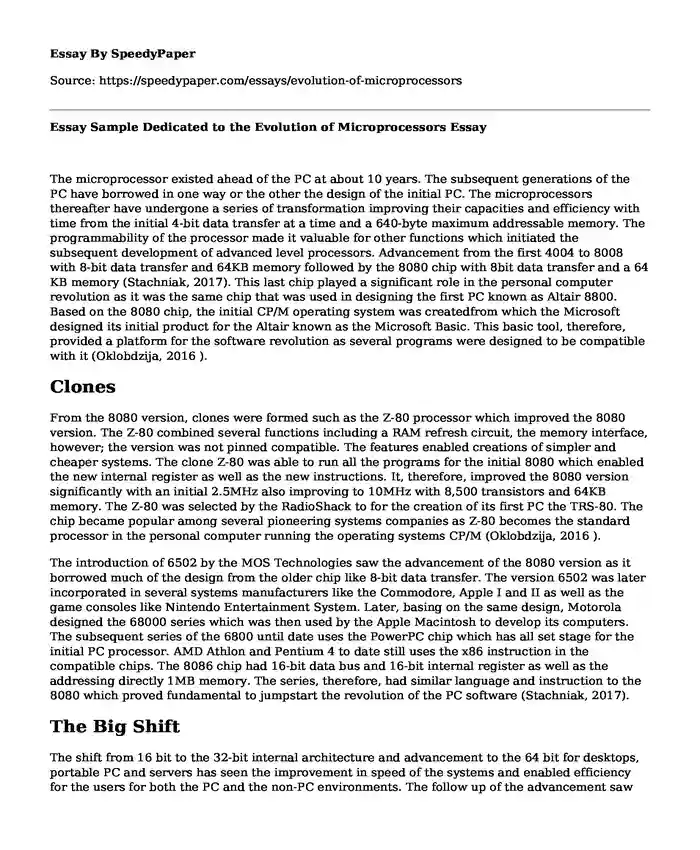
| Type of paper: | Essay |
| Categories: | Computer science Electronics |
| Pages: | 3 |
| Wordcount: | 786 words |
The microprocessor existed ahead of the PC at about 10 years. The subsequent generations of the PC have borrowed in one way or the other the design of the initial PC. The microprocessors thereafter have undergone a series of transformation improving their capacities and efficiency with time from the initial 4-bit data transfer at a time and a 640-byte maximum addressable memory. The programmability of the processor made it valuable for other functions which initiated the subsequent development of advanced level processors. Advancement from the first 4004 to 8008 with 8-bit data transfer and 64KB memory followed by the 8080 chip with 8bit data transfer and a 64 KB memory (Stachniak, 2017). This last chip played a significant role in the personal computer revolution as it was the same chip that was used in designing the first PC known as Altair 8800. Based on the 8080 chip, the initial CP/M operating system was createdfrom which the Microsoft designed its initial product for the Altair known as the Microsoft Basic. This basic tool, therefore, provided a platform for the software revolution as several programs were designed to be compatible with it (Oklobdzija, 2016 ).
Clones
From the 8080 version, clones were formed such as the Z-80 processor which improved the 8080 version. The Z-80 combined several functions including a RAM refresh circuit, the memory interface, however; the version was not pinned compatible. The features enabled creations of simpler and cheaper systems. The clone Z-80 was able to run all the programs for the initial 8080 which enabled the new internal register as well as the new instructions. It, therefore, improved the 8080 version significantly with an initial 2.5MHz also improving to 10MHz with 8,500 transistors and 64KB memory. The Z-80 was selected by the RadioShack to for the creation of its first PC the TRS-80. The chip became popular among several pioneering systems companies as Z-80 becomes the standard processor in the personal computer running the operating systems CP/M (Oklobdzija, 2016 ).
The introduction of 6502 by the MOS Technologies saw the advancement of the 8080 version as it borrowed much of the design from the older chip like 8-bit data transfer. The version 6502 was later incorporated in several systems manufacturers like the Commodore, Apple I and II as well as the game consoles like Nintendo Entertainment System. Later, basing on the same design, Motorola designed the 68000 series which was then used by the Apple Macintosh to develop its computers. The subsequent series of the 6800 until date uses the PowerPC chip which has all set stage for the initial PC processor. AMD Athlon and Pentium 4 to date still uses the x86 instruction in the compatible chips. The 8086 chip had 16-bit data bus and 16-bit internal register as well as the addressing directly 1MB memory. The series, therefore, had similar language and instruction to the 8080 which proved fundamental to jumpstart the revolution of the PC software (Stachniak, 2017).
The Big Shift
The shift from 16 bit to the 32-bit internal architecture and advancement to the 64 bit for desktops, portable PC and servers has seen the improvement in speed of the systems and enabled efficiency for the users for both the PC and the non-PC environments. The follow up of the advancement saw the introduction of the dual-core processor which has the capacity to perform the work for two processors at the same time increasing efficiency in terms of speed (Oklobdzija, 2016 ). It also enables the user to enjoy both the advantages of using the 64 bit and dual-core computing.
In the recent past with the internet being open to everyone, there has been demand for servers with the ability to handle several independent requests over the internet. Several requests from file services, web pages or databases are across many individual computers using conventional microprocessors of very high performance. Many users of the modern computers have for a long time focused on the ability of their PCs to respond faster to their commands; the position is changing as many users are currently interested in the ability of the computers to multitask several commands at a time. This has encouraged the designers to create programs that can as well run background tasks.
Conclusion
The modern work environment has appreciated the need for the technological transformations in terms of the ability of the PCs to multitask therefore a multiprocessor are therefore needed to break up the particular long-latency thread into small threads capable of being executed individually. In the future, there is a possibility of having some technology that will use automatic parallelization as this has only been used in the FORTRAN programs. The application if well spread to PCs, computations involving dense-matric numerical will enable wholesome efficiency (Stachniak, 2017).
References
Oklobdzija, V. &. (2016 ). High-performance energy-efficient microprocessor design. Dordrecht, the Netherlands: Springer.
Stachniak, Z. (2017). Inventing the PC. Montreal: McGill-Queen's University Press.
Cite this page
Essay Sample Dedicated to the Evolution of Microprocessors. (2022, Jul 28). Retrieved from https://speedypaper.net/essays/evolution-of-microprocessors
Request Removal
If you are the original author of this essay and no longer wish to have it published on the SpeedyPaper website, please click below to request its removal:
- Accounting Essay Sample on Valuing Companies with Assets That Are Said to Be Intangible
- Is ISIS a Brand? Free Essay Sample
- Competitive Strategy and Supply Chain Management - Essay Sample for Everyone
- Nursing Essay Sample about Evidence Based Practice Summary
- Hashtag Activism Essay Example
- Essay Example: Stigma and Reentry in the Community
- Paper Example - The fire service department in the United Kingdom
Popular categories




